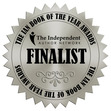Ruth Badley's Blog, page 2
June 27, 2021
The Wishing Shelf Book Awards
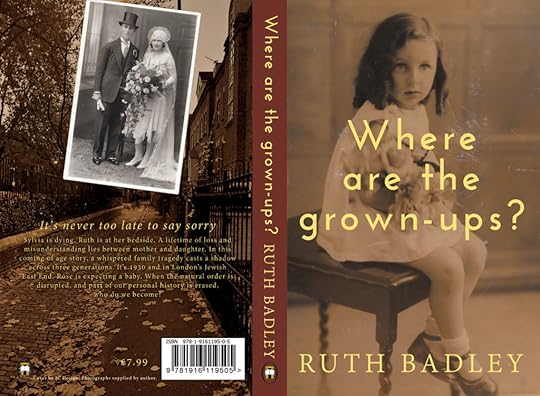
The Wishing Shelf Book Awards named Where are the grown-ups? as a finalist in the 2020 Adult Non-Fiction category. It’s rare in any book award to receive specific feedback from the judges but this is an option all entrants to this award can take up.
A judging panel of 17, based in London and Stockholm assess all the books and pick the winners. The authors receive valuable feedback and a star rating based on the stated criteria of Editing, Writing Style, Content and Cover. Here are the stats!
Editing: 9/10
Writing Style: 10/10
Content: 9/10
Cover: 7/10
Of the 17 readers:
17 would read another book by this author.
13 thought the cover was good or excellent.
17 felt it was easy to follow.
17 would recommend this book to another reader to try.
Of all the readers, 6 felt the author’s strongest skill was ‘subject knowledge’.
Of all the readers, 3 felt the author’s strongest skill was ‘honesty’.
Of all the readers, 8 felt the author’s strongest skill was ‘writing style’.
16 felt the pacing was good or excellent.
17 thought the author understood the readership and what they wanted.
Readers’ Comments
“Although this is a deep and often moving story, it’s funny in parts too. In this well-crafted memoir, the author charts her complicated relationship with her mother. I felt sad reading parts of it, but there was always an underlining theme of hope. Very enjoyable.” Female reader, age 34
“Firstly, although I felt the cover lacked pow, the title is superb, pulling me into the author’s story. This is an excellent autobiography highlighting how flawed parents are even when we thought they were so perfect. Intimately and
honestly written, this will appeal to anybody who has an up and down relationship with a parent – which, I guess, is pretty much everybody!” Female reader, age 49
“Parents, I find, can be difficult at the best of times. What a fabulous read with a fabulous title. I felt I really got to know the author whilst reading this – and the people who have filled her life.” Female reader, age 41
“Tragic in parts, hilariously funny in others, this is a compelling memoir written by an author who has excellent writing skills. If she ever writes a novel, I’ll be buying it.” Female reader, age 69
To Sum It Up:
‘A superbly written memoir charting the ups and downs of a mother and daughter relationship. A FINALIST and highly recommended!’ The Wishing Shelf Book Awards
I was thrilled to receive the comments above and feel very motivated to get my next book finished. Bitesize World – a memoir of travel, food and live entertainment is coming soon!
In the meantime I have been asked to enter the audiobook format of Where are the grown-ups? for The Wishing Shelf Book Awards 2021. This is a brand new category and will be assessed on listening pleasure! Fingers crossed!
May 26, 2021
An Online Event for Family History, Ancestry and Genealogy Researchers
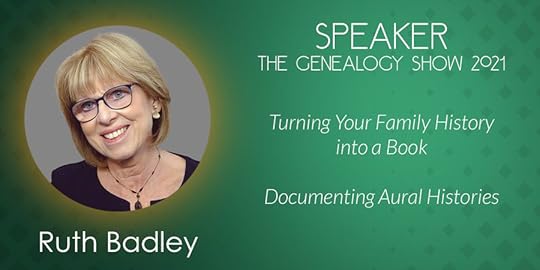
TheGenealogy Show is a two-day virtual event from
Friday 25June (12:00AM BST) – Saturday 26 June 2021 (11:59PM BST)
I’m aspeaker this year and in two online talks for The Genealogy Show I will betalking about the practical ways you can go about turning your family historyinto a book or a recording.
I willexplain the background research that inspired me to want to bring my mother andgrandmother’s story to life in Where are the grown-ups? and givesome tips and advice on the different ways you can document aspects of your ownfamily’s story.
Once thevideos have gone live on the Main Stage, they will also be deposited into theOn-Demand section where the content will be available to ticket holders for 30days.
Friday 25thJune at 11:20 am
DocumentingAural & Oral Histories
Saturday26th June at 3:20 am
TurningYour Family History Into A Book
Buy ticketsfor The Genealogy Show here https://bit.ly/3bRmyP5
January 25, 2021
Colchester Holocaust Memorial Day 2021
The organisers of Colchester’s Holocaust Memorial Day asked me to contribute to this year’s online events and I am grateful for the opportunity to make it meaningful despite the current restrictions. Since 2007 the University of Essex has marked Holocaust Memorial Day with a week of remembrance events taking place around the anniversary of the liberation of Auschwitz Concentration Camp by Soviet troops. Below is my transcript of a recording made for the Group’s YouTube channel. https://www.youtube.com/channel/UCvYQGax1Wp1xajnCKsirY9A
When I was asked to talk about a piece of art or literature that relates to the Holocaust, I just happened to be reading Motherwell, a memoir by the acclaimed journalist Deborah Orr.
I didn’t expect to find a reference to the Holocaust in a memoir about a dysfunctional working class Scottish childhood, but less than a quarter of the way in to the book the author remembers her mother telling her about it and that she felt sorry for Anne Frank.
Deborah Orr goes on to describe how she first became aware of the enormity of the genocide. I gasped with recognition because the feelings she had mirrored mine. She was about ten years old. I was a year or two younger. This is what she says.
“By accident I saw a bit of The World at War on telly. I saw clips of emaciated prisoners and of skeletal bodies being bulldozed into open pits, then sprinkled with lime. Alone in the living room I stared, transfixed at moving pictures I’ve never forgotten. No one forgets them I imagine.”
“I was far too young to see such images and be able to processthem. But that Sunday the telly had been left on, probably after my dad hadbeen watching some sport.”
This is where Deborah Orr’s experience differs from mine, becauseunlike myself, Deborah Orr wasn’t from a Jewish family. This is what she saidhappened next.
“My mum tried to soothe me after I’d seen these things. I remembersitting on her knee and being cuddled, a bit too big to be comfortable any morewhile she explained that we’d have been okay if Hitler had won because we were‘blue-eyed and blonde’. Which just confused me more. My mum had brown hair.Wouldn’t she have been killed? She explained that it wasn’t just what colouryour hair was. Dark hair was a hint that you might be Jewish. There was adifference between having normal dark hair and Jewish dark hair. It was adifference I couldn’t quite fathom.”
When I saw those same pictures on The World at War, memorably narrated by Sir Laurence Olivier, the television in our house in North London had not been left on by accident. My father was watching the programme. Perhaps he was unaware that I was also in the room. Perhaps he thought I wasn’t paying attention or I was too young to understand or question what I was seeing. In my house, the adults saved themselves a lot of bother by believing that children had no curiosity about the injustice and cruelty of the adult world. Instinctively I knew this and therefore asked no questions.
Even at that age I had a sense that my father might be hurt if my innocence was tainted by knowledge of such unspeakable horror. My mother didn’t offer any comfort, as Deborah Orr’s did because she left the room as soon as the programme started. She never wanted to hear any more about concentration camps. It was just too awful. She was a teenager when the famous report from Bergen Belsen was first broadcast on the radio.
I was a reader and I found answers to my questions about the Holocaust in books. Books written by people who had lived experience of what the genocide involved and how it was accomplished. As an adult I have watched a lot of historical film footage, been to the places where the atrocities have taken place, visited many museums and memorials. Always I return to the child I was back then, frightened by pictures of the evil that could seep into the safety and security of my home leaving my parents powerless to stop it.
Two things happened very recently which made me think again about the power of images to influence and educate those who still remain ignorant about the Holocaust. The coverage of the assault on Washington’s Capitol by domestic terrorists was widely covered on social media and the images used by law enforcement agencies to arrest and prosecute many of the key players responsible for the outrage.
There was much discussion on social media about the meaning behind a Nazi slogan depicted on banners and T shirts, ‘work makes you free’ with many of the enlightened pointing out it was the notorious motto, cynically alluding to certain death displayed at the entrance to Auschwitz. It transpired that for some perfectly reasonable, educated people this appeared to be totally new information.
During the assault on the Capitol disturbing examples of antisemitism were on display. The Jerusalem Post reported that Israeli journalists were singled out for harassment and insults. Pictures of a rioter wearing a ‘Camp Auschwitz’ ‘staff’ hoodie were widely circulated online. Another wore a t-shirt saying 6MWE, meaning ‘Six Million Wasn’t Enough’.
My hope is that a significant number of children and adults across the world that saw those horrific images felt compelled to find out for themselves what these slogans stand for, the evil they represent and how that plays out when left unchallenged.
This is my hope for Holocaust Memorial Day 2021. The victims must never be forgotten. Thank you for reading and listening.
November 9, 2020
Success for Where Are The Grown-Ups? at Independent Author Network Book of the Year Awards 2020
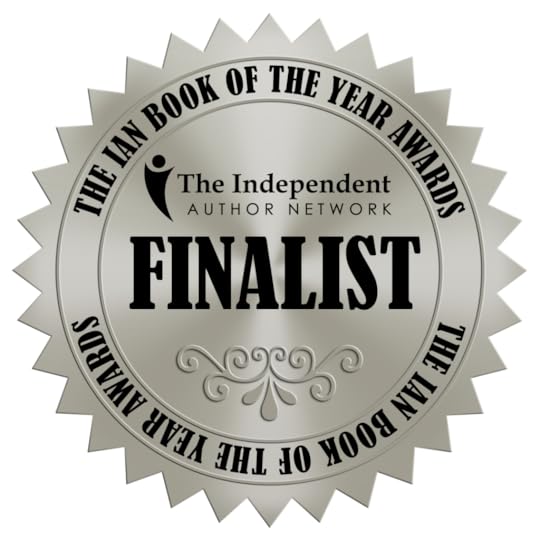
Where are the grown-ups? is among the finalists in the Memoir category of the Independent Author Network Book of the Year Awards 2020.
The US-based book contest, endorsed by the Alliance of Independent Authors is open to entries from across the English speaking world. The judges are experienced reviewers, authors, publishers, and editors.
Where Are The Grown-Ups? explores the impact of a domestic
tragedy on parent and child relationships through three generations of the
author’s family. Using a combination of lived experience and historical research
the poignant, true story tells of a young woman’s untimely death in the Jewish
East End of London during the spring of 1930. Nearly 90 years later the
granddaughter she never knew pieces together the missing fragments of their
shared history.
With universal coming of age themes of identity and inheritance, readers are introduced to a cast of characters that often unwittingly repeat the mistakes of the past. Where Are The Grown-Ups? is a deeply personal, often frank, but ultimately uplifting portrayal of the complexities and challenges of family life that will resonate strongly with those that lived through the 1960s and 70s.
Ruth Badley is an author, speaker and ghost writer with a background in drama, education and journalism. She trained at the Central School of Speech and Drama in London and worked in secondary and further education, before establishing a successful career as the arts editor and features writer for a regional newspaper group. She has spoken on BBC radio and written articles for national newspapers and family history magazines. She gives talks to book clubs, literary festivals, genealogical societies, writing and womens’ groups.
Where Are The Grown-ups? is available in paperback and e-book format. An audio book will soon be available. Red Lion Books, Colchester stock copies of the paperback. Order the book via Amazon.co.uk here

.
September 25, 2020
An audio interview with Robin Quinn of the Independent Writers of Southern California
Members of the IWOSC based in LA joined a zoom session on Turning Your Family History into a Book. Ruth Badley, author of Where are the grown-ups? answers questions from facilitator, Robin Quinn.
August 10, 2020
The author answers questions posed by Fennel Grove Book Club
Members of Fennel Grove Book Club read Where are the grown-ups? and sent me a list of questions about the story. The club is based near Ripon, North Yorkshire but a surprising number of members have roots in East London. Their questions show great insight and empathy. Check out the YouTube link https://youtu.be/0lYyWBKCBL4
Read the full transcript below.
Hello everyone at Fennel Grove Book Club. Thank you for inviting me to talk about Where are the grown-ups? I would just like to say I have given talks to many groups of people – readers, writers, and historians and I was genuinely touched to read your questions which show so much empathy and insight into my story, so I am looking forward to giving you a bit more detail.
Where are the grown-ups? is my first book and I describe it as a multi-generational family memoir. It’s about me, my mother Sylvia and the grandmother I didn’t know, called Rose. It reflects on the impact of a hidden tragedy within my family that affected us all – namely Rose’s death at the age of 25. It’s a true story about real people and real events in a specific period of past time. Some parts of it are written as my own lived experience and other sections rely on historical research and information gleaned from historical documents, archives, and journals.
Jenny asks: I was very interested in the details of life of Jewish communities in the East End. How did Ruth research this? How much was direct experience, albeit handed down within the family?
We as a family were not religious but being Jewish is more than a religion, it’s a culture and a shared understanding. This is what I identify with. I know that my ancestors would have been much more religious because of the time and the community in which they lived and their own immigrant background. For example, they used a lot more Yiddish language in conversations than I used in the book because I heard them doing so. Becky and Jack for example were the grandparent figures in my growing up and I am pretty sure they only ate kosher food and observed the religious holidays because it was the normal way of life for them and everyone they knew. My parents were of the generation that ‘bettered’ themselves and were able to move away from East End to the North London suburbs and I suppose they had less inclination to observe a strictly religious way of life but they definitely identified with the culture and the more liberal side of the religion. My mum tried with the religious side for a while when we were young, but she soon gave up. I always knew the rules we were breaking, and it caused me some confusion as a teenager as I wasn’t quite sure I fitted in anywhere. On the research side I read a lot about the Jewish communities in the East End at this time and spoke to historians to supplement what I already knew. I made a deliberate decision in the book not to include too much Yiddish because I didn’t want readers to be distracted from the human emotions. So I was selective about the details I included to make it interesting to people who don’t know much about Jewish culture and realistic for those who do.
The repetition of the relationship between mothers and daughters across generations is such a familiar theme to us all. Does Ruth now feel that resolution is possible or is acceptance the most realistic and reasonable outcome?
I started writing Where are the grown-ups? as a response to grief. I didn’t even know if I had a story that would make a book but I needed to find a way to make sense of the relationship I’d had with my mother and try and figure out what had gone wrong. Recalling scenes and situations and from my childhood and how they played out helped me do this. And of course, I knew from the start that my mother’s birth and childhood would be the crux of the story. Writing it has given me a much fuller understanding of my mother and helped me make peace with the past. It’s also done something else that I couldn’t have imagined at the start. It’s given Rose a longer life in print than she was allowed on earth and I’m proud to have done that as her granddaughter.
Shirley asks: Of course there are many differences in Ruth’s story to that of my childhood and early adulthood but there are similarities too. Is the story completely autobiographical or have you included some fictional elements too?
Part 1 and Part 3 are completely autobiographical. Those events, relationships and situations really happened because I lived them. Part 2 is based on evidence and historical documents. Rose’s occupation, marriage, the cause of her death and the outcome are all true. I wasn’t there at those key moments but knowing the situations, the people, the relationships and the outcomes, I used my imagination to fill in the gaps. I can give you example of what I mean. My mother was told, probably by one of the aunts, that after Rose died there was a family meeting at the house where everyone decided what to do about the baby. She was told her father arrived at the house holding her in his arms and laid her down on an old sofa while the adults had a discussion. When I came to recreate this scene in Part 2. I had to decide where Boy had come from and I decided he walked back home from the hospital with his newborn daughter in his arms, and Rose’s death certificate in his pocket. In reality, he couldn’t have walked home because I know that the actual hospital where Rose died was too far away but I wanted to show how helpless and broken he was at this moment and having him walking through the streets, and having to deal with the responses of the community he encountered on the way, helped to underline this.
Catherine says: I enjoyed Ruth’s consideration of the mother/daughter relationship because my own mother died 4 weeks ago and I too am currently thinking a lot about the past, my mother and growing up around the same period.
Given that no two children have the same mother (i.e. different mothering within families albeit from the same person) I kept wondering what Simon’s view of the same events was and if so how would it differ from your own emotional response? How different a mother was she to Simon?
First I know exactly what you are going through and thinking about the past is something that is part of the grieving process. To address your question, I made a very deliberate decision not to speak for Simon in the book, not to put words in his mouth, nor make him a fully developed character because as you point out his experience was different from mine and my mother related to him in a very different way. I was anxious about Simon reading it because I thought he wouldn’t agree with my interpretation of events. I couldn’t have been more wrong! He thinks I have it spot on and believes ( correctly) he was the ‘golden boy’ in our mother’s eyes. I had no idea up to this point that he felt any of this on my behalf and is very supportive of the book.
I also wondered whether or not you felt that the extended family relationships and responses were universal or were specifically a response from the Jewish culture and community in that place and time?
I’m continually surprised by readers who are not Jewish, but have East End roots, that tell me of similar situations that occurred in their family – a baby being brought up by other family members, the shame of illegitimacy, extended families all living together, unexpected death. I’m inclined to think there was more fluidity in families to solve particular problems, or hide a shameful birth, especially in poor communities like the East End back then. Secrets within families seemed to be much more common. Rose was very definitely air-brushed out of our family history. Becky didn’t want Sylvia pining for her birth mother and Boy’s second wife certainly didn’t want to acknowledge the past. In the book I call this a conspiracy of silence. This was brought home to me very recently. Publishing the book has put me in contact with a couple of relatives that I didn’t know I had. One told me that she remembers Boy and Eva attending her wedding and she showed me photos of them on that occasion. Until she read my book, she had no idea that Eva was his second wife.
Which were the easiest sections to write and which needed the most re-working?
The content for Part 1 came quickly and also the structure of the story. I knew I didn’t want to tell the story in a straight line. I wanted to create some intrigue so by the end of the first section of the story I want the reader to wonder what had made Sylvia like she is. I got very stuck in the middle of Part 2 when Sylvia was a teenager, so I left it and wrote quite a bit of Part 3 and went back. My lived experience was much quicker to write but not easier.
Anne comments: You talk about your “memory mirror”, and what a memory it is to be able to evoke the past like you have!! The descriptions of incidents are so sharp and the words you use paint such a vivid picture, I feel as if I can actually see the story unfold. Also, a lot of your memories have strong emotions attached to them. How do all those words come into being. Do they just arrive, or do you have to go deep inside to find words to describe the feeling? You talk at one stage of your younger self not having the words to describe your feelings and that leading to frustration.
That’s so interesting. I can try to explain but to be honest in the writing I was surprised myself at how much came back. I think memoir writers have an emotional memory that they call on. I just know that when I was writing those scenes I was back in that house, with the furniture. I could feel the texture of the Draylon settees, look inside the kitchen cupboards, smell the hair lacquer and feel what I felt when I heard my mother talking to another man on the telephone. I shed a lot of tears in the writing too. I think it takes some maturity and some distance to find the words to express the intensity of what I felt back then. A child doesn’t know how to and also doesn’t dare, so those feelings get pushed down somewhere but they don’t go away. I was taken aback by how near the surface it all was. The great challenge for me was trying to recreate the same emotional impact in scenes that I didn’t experience myself.
It is nice to read the words and be reminded of that period of time and linking it to my past too. It is particularly interesting when there is a real connection with the words and the emotions. One the first page you talk about the airless hospital room and refer to “this particular limbo where it is possible to know and at the same time, not know”. That phrase perfectly describes my own feelings in a very similar situation except I have never put it into words but that was it.
I think at moments of great personal impact, like the death of a close relative, often we are subconsciously observing our own reactions. Despite all the evidence to the contrary I know I remained in denial that my mother was actually dying, right up to the point when she passed away. I couldn’t seem to take it on board, until I absolutely had to, even though it was plain to see. It’s how we cope with death and grief I guess, just one step at a time.
Pam says: I have now finished the book and like us all it was reminiscent of much of my childhood growing up in south east London. So many of the products are familiar to me too – my mum’s favourite perfume for a time was Coty L’Aimant (black bottle), the little black block mascara, Elnett hairspray in a gold can and of course my dad proudly decorating with fake tile anaglypta!
My questions for Ruth are: To quote from the book:
……children are witnesses to their parents growing up…As children we
assume our parents are perfect…but mums and dads will inevitably misbehave,
test the boundaries and make mistakes, before they become the men and women
they need to be.”
Having had a difficult relationship with her own mother, did the above observation affect how she related to her own 2 sons and her relationship with them?
So glad you enjoyed the mention of the products. Details like that are so evocative of a time period. Yes, I was all too aware that the mistakes of the past can be subconsciously repeated. It was one of the reasons that I never wanted a daughter. I feel having two sons has to a certain extent broken the spell and disrupted the pattern. In the past there was very little attention paid to child psychology and the effect on children of what they might observe or pick up from their parents. Certainly, my mother believed that children didn’t understand the adult world but I know from experience that children understand very well when their parents are troubled. I think parents need a certain amount of self-awareness to understand the impact of their emotional life on their children and I never wanted my sons to feel the insecurity that comes when you are a witness to one of your parents being unhappy with the other. One of the things I really struggled with was accepting my parent’s new partners and only one of them turned out to be worthy of acceptance! Even as an adult it was something I still struggled with. In the few years before she died my mother had a very possessive male friend. She was in her 80s (he was in his 90s) and I really resented his presence. I know I should have been happy that she wasn’t lonely but I am ashamed to say I didn’t feel that at all. To me it was a time when I could have got to know my mother a little better and maybe repair some damage but there was this annoying stranger standing in the way all the time.
Ruth refers a lot to Jewish customs which were not
observed by the family as she was growing up. Any regrets?
No none at all. The religious rituals are most obvious to me at weddings and funerals and that is still the case. You can’t pretend to be religious and as I said before the religion is a small part of what it means to be Jewish. I observe things in my own way. I take an active part in Holocaust Remembrance Day and like my mother I believe in the spirit world. I wrote a little about that towards the end of the book. I visit places associated with my family and their graves at lot and that is very meaningful to me. My younger son is very interested in the Jewish religion and knows very much more about it than I do. His grandma would be delighted! My husband isn’t Jewish – or so we thought – in fact his maternal grandmother was Jewish and she is buried in a Jewish cemetery, so technically he is as Jewish as I am!
Sue comments: As someone interested in my own family history – and having East London links in the same period that Ruth writes about – I was very interested in the social history described in the book. Also, the mother/ daughter relationships.
In the first chapter of the book there is a very tender exchange between Ruth and Sylvia. I returned to this after I had read the rest of the book and wondered whether Ruth felt that her relationship with her mother had changed in later years and if so, how that came about.
Love is complicated isn’t it? Yes it did change. I always wanted her approval and she wanted mine but somehow we couldn’t give each other what we both longed for. In the scene in the hospital for example, something important passed between us that had eluded us in all of the previous years. When she left the family home, I had some mental health problems which manifested in me subconsciously trying to be her. I didn’t understand this at the time but looking back that’s what was going on. I had this obsession with cleaning and I wore her clothes and I was very confused and unhappy. I somehow got entangled in a serious relationship with a coercive individual that could have been a total disaster and I really wanted my mum to step in and do something that would help to end it. I spoke in the book about having a fantasy that she lost it with his family – but it wasn’t a fantasy – this actually happened. Then when my dad married Dina her we found some common ground in our mutual distrust of this woman. My mum took quite an unhealthy interest in what my dad got up to after they divorced and I was very willing to supply the information because Dina was just a despicable woman, much like Eva had been to my mum, I suppose. Then as I said earlier when my dad died and then David, we could have become a little closer if it hadn’t been for another individual coming along. She was very reliant on other people by then so it suited her to have another partner. I didn’t include him in the book because I didn’t rate him as being of the slightest significance to the story plus he is still alive and wouldn’t care for what I would say about him!
I also wondered at what stage in her life Sylvia had written ‘Just for the Record’ and how she responded to Ruth delving further into the family history. Was it easy for Ruth to talk about the past with her mother?
She wrote Just for the Record about ten or fifteen years before she died, so in her seventies. My brother and I were talking about the timing of it just last week. We agreed that it was written as a response to a project I did about my father. I interviewed my father about his life, recorded the conversations and put it together in a book – not for publication, just for circulation within our famiIy. This was also a handy thing to have because there is an account in there of how my father met my mother in his words, which I included my book. I think my mother was secretly a bit miffed by me interviewing my dad and so she decided to write her own life story. I am very grateful she did because it gave me an accurate viewpoint on many relationships and events in her life that ended up in the book and I could also see in her own words what she didn’t know and what there was to find out about the circumstances.
I remember reading it for the first time and her saying to me, ‘Well, what do you think?’ in a way that implied, ‘you think you’re the writer and the journalist but I can do this stuff too.’ I remember my response which was heartfelt. I said I thought it was a complete and utter tragedy that she never knew her mother. I had no inkling at that point that I would one day write a book about it but the events she described stayed with me for a very long time after that and after she died it was the first research document I looked at when I started piecing the story together. I couldn’t talk to my mum about our past but after I finished the book I really wished I could have told her what I’d found out about Rose. I couldn’t have written the book in the way that I did while she was alive, though.
People sometime ask me what I think my mother would have thought of the book. So ending on a lighter note, now you all know a little about my mother, two things would have annoyed her. First I reveal her true age. She always took five years off and left instructions in her will that her headstone was to say she was born in 1935. We obeyed her wishes but I know she was born in 1930 and I have revealed that. Secondly, she would have preferred a much more glamourous front cover! The photographs of her as a small child is one I found after she died, along with the wedding photo of her parents on the back cover.

August 4, 2020
New information from an invoice dated 1933
The second part of my memoir, Where are the grown-ups? required some historical research. I didn’t include everything I found out and some questions are only occurring to me now, so I am still adding to my knowledge. Here is an example.
I wondered which firm of East End stonemasons would have made my grandmother’s headstone. Now I have the answers. The services of Rose Brothers of Stepney Green were called upon twice in three years. First in 1931 for coincidentally, my grandmother, Rose Dehaan and then in 1933, for her sister Esther Fellman (Hetty in my book). This is the invoice for Hetty’s stone. A £3 deposit and a total cost of £33. Both are buried in East Ham cemetery. My great-grandparents Harry and Jane Wagenhuizen endured the tragedy of burying both their daughters.
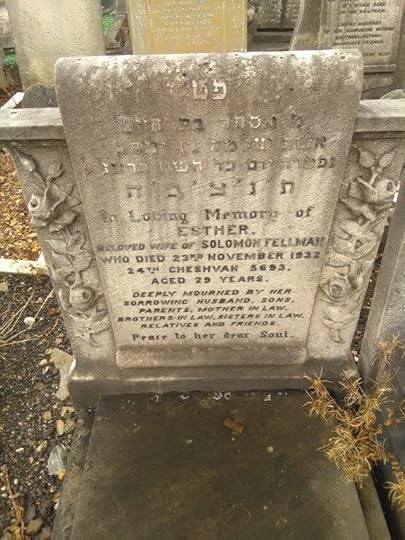
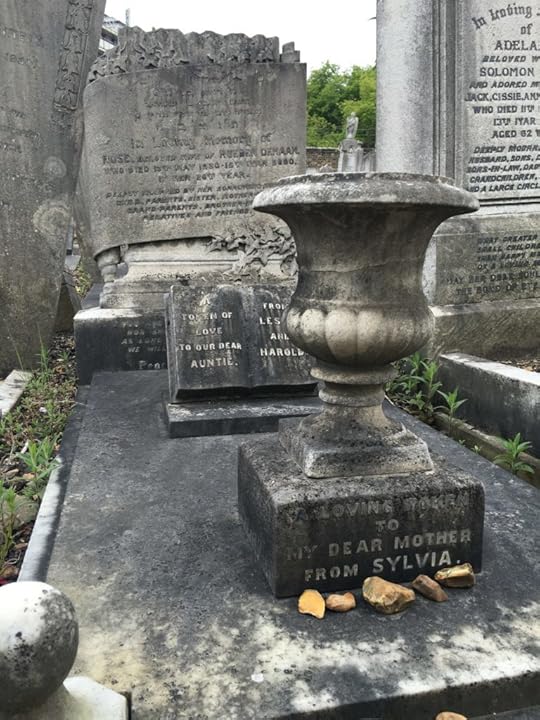
The Great Escape
The Daily Telegraph’s feature on moving from a city to a rural location features Ruth and Tim Badley as one of three case studies. The journalist was kind enough to mention Where are the grown-ups? in our intro.

Ruth and Tim Badley case study

July 16, 2020
Guest author for Memoir Mentors
A presentation, discussion and Q&A on all aspects of using your family’s story as material for a book. The group chose to read Where are the grown-ups? and invited me to talk about the themes, ideas and structure. Memoir Mentors is a writer’s group, based in Munich. For info about the book. https://amzn.to/2tNvGBj
Click on the link to watch. https://youtu.be/pETWykcFGFg
Author talk to The National Women’s Register
An audience of some 50 plus NWR members joined me online for a presentation and Q&A on Where are the grown-ups? http:// https://amzn.to/2tNvGBj Click on link to watch. https://m.youtube.com/watch?v=k129UejO-Zo&feature=youtu.be

